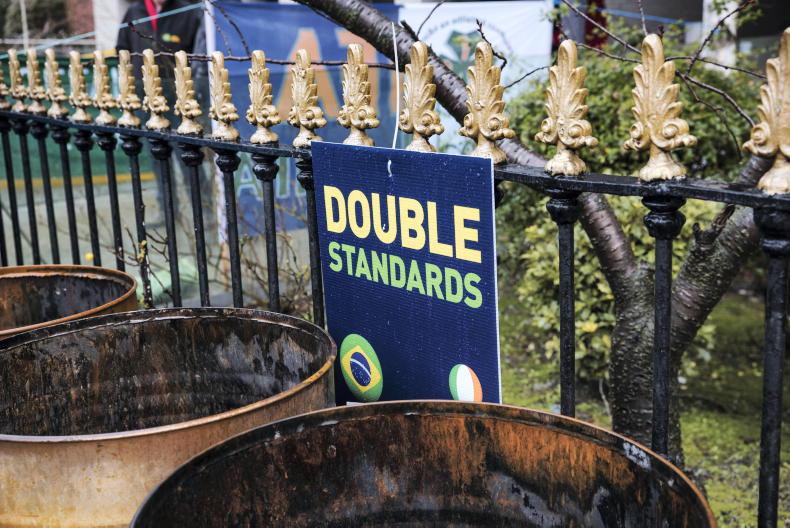As we turned for home, my dog Bella buried her nose in the snow, sniffing for the track we had made on our way to the summit of Sliabh-na-mBan. I looked out through the swirling drift for the familiar landmarks I had known all my life, but with visibility low, I too turned my eyes to the ground to seek footprints in the predominantly blank canvas.
This most recent walk up the Mountain of the Women fell between International Women’s Day (IWD; March 8) and Mother’s Day (March 19). Articles relative to the latter date are scattered through this week’s edition, including Maria’s poignant interview (see rise) with co-founder of Féileacáin Mairie Cregan and her daughter Aoife O’Connor. Féileacáin is Ireland’s stillbirth and neonatal death association. Although my two girls have often made this climb with me, on this day in the snow, the singular human footprints made me think of the missing footprints from many Irish families. Recording these footprints is just one of the many supports offered by the association. Mairie comments that you most likely won’t have heard of Féileacáin unless you have been touched by them. However, with up to 1,000 of the association’s memory boxes distributed annually, many families are unfortunately all too familiar.

Amii McKeever and her dog Bella on route to the summit of Sliabh-na-mBan before the snow melted in early March.
The wording of equality
On IWD, it was announced that a referendum on gender equality would take place this November. Although secured by the Citizens’ Assembly on Gender Equality and the Special Joint Oireachtas Committee on Gender Equality, this conversation has been ongoing since the drafting of the Constitution in 1937. Commonly referred to as the “a woman’s place is in the home article”, some historians argue that Article 41.2 was never intended to confine women to the home or limit their rights. Others, from the Suffragettes on, disagreed. Extracts from law journal The Irish Jurist assert Article 41.2 ‘may’ be read in two ways. The first as ‘a tribute to the work done by women in the home as mothers’, the second ‘the grossest form of sexual stereotyping’.
The wording for the referendum will be paramount. This wording, despite the years of debate, will not be set in stone until mid-May. We often receive letters from women who have worked on farms and in the home all their lives but are entitled to very little unless this work is formally recognised. In many instances, this recognition is dependent on their spouse (see legal). Unpaid informal work caring for children or dependents, while invaluable, is seldom recognised. While caring work is currently disproportionately undertaken by women, the wording needs to maintain recognition of this key role in society but in a gender-neutral way. Conventional views of the family have changed considerably since 1937 both in makeup and the perception of traditional gender roles. A further example of how a law – intended to protect mothers – has had an unintended opposite consequence, is the treatment of parents of children born through surrogacy. These parents are still waiting for the legislative change required to be recognised as legal parents of their children despite a Government announcement last December (see surrogacy).
The current provisions in 41.2 do not reflect the lives of Irish women, and/or the role of fathers, second parents or carers in the modern family. Like stepping out into the early morning snow, the Government now has a blank canvas to create footprints that walk side by side on an equal gender footing.
Read more
Editorial: lowering your stress gauge in the garden
Research on female leadership shows that two are becoming one
As we turned for home, my dog Bella buried her nose in the snow, sniffing for the track we had made on our way to the summit of Sliabh-na-mBan. I looked out through the swirling drift for the familiar landmarks I had known all my life, but with visibility low, I too turned my eyes to the ground to seek footprints in the predominantly blank canvas.
This most recent walk up the Mountain of the Women fell between International Women’s Day (IWD; March 8) and Mother’s Day (March 19). Articles relative to the latter date are scattered through this week’s edition, including Maria’s poignant interview (see rise) with co-founder of Féileacáin Mairie Cregan and her daughter Aoife O’Connor. Féileacáin is Ireland’s stillbirth and neonatal death association. Although my two girls have often made this climb with me, on this day in the snow, the singular human footprints made me think of the missing footprints from many Irish families. Recording these footprints is just one of the many supports offered by the association. Mairie comments that you most likely won’t have heard of Féileacáin unless you have been touched by them. However, with up to 1,000 of the association’s memory boxes distributed annually, many families are unfortunately all too familiar.

Amii McKeever and her dog Bella on route to the summit of Sliabh-na-mBan before the snow melted in early March.
The wording of equality
On IWD, it was announced that a referendum on gender equality would take place this November. Although secured by the Citizens’ Assembly on Gender Equality and the Special Joint Oireachtas Committee on Gender Equality, this conversation has been ongoing since the drafting of the Constitution in 1937. Commonly referred to as the “a woman’s place is in the home article”, some historians argue that Article 41.2 was never intended to confine women to the home or limit their rights. Others, from the Suffragettes on, disagreed. Extracts from law journal The Irish Jurist assert Article 41.2 ‘may’ be read in two ways. The first as ‘a tribute to the work done by women in the home as mothers’, the second ‘the grossest form of sexual stereotyping’.
The wording for the referendum will be paramount. This wording, despite the years of debate, will not be set in stone until mid-May. We often receive letters from women who have worked on farms and in the home all their lives but are entitled to very little unless this work is formally recognised. In many instances, this recognition is dependent on their spouse (see legal). Unpaid informal work caring for children or dependents, while invaluable, is seldom recognised. While caring work is currently disproportionately undertaken by women, the wording needs to maintain recognition of this key role in society but in a gender-neutral way. Conventional views of the family have changed considerably since 1937 both in makeup and the perception of traditional gender roles. A further example of how a law – intended to protect mothers – has had an unintended opposite consequence, is the treatment of parents of children born through surrogacy. These parents are still waiting for the legislative change required to be recognised as legal parents of their children despite a Government announcement last December (see surrogacy).
The current provisions in 41.2 do not reflect the lives of Irish women, and/or the role of fathers, second parents or carers in the modern family. Like stepping out into the early morning snow, the Government now has a blank canvas to create footprints that walk side by side on an equal gender footing.
Read more
Editorial: lowering your stress gauge in the garden
Research on female leadership shows that two are becoming one










SHARING OPTIONS